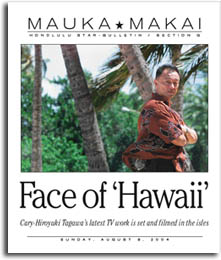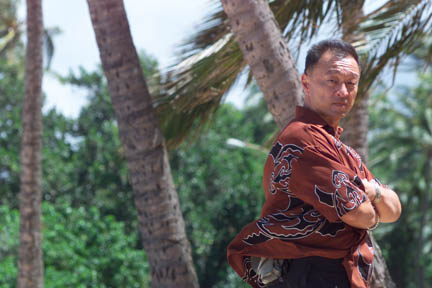

 MAKAI ]
MAKAI ]

|
Polishing his star
The only island actor with a big role
in NBC's new cop show shoots
for realism
Cary-Hiroyuki Tagawa seemed to have disappeared from films and television the last couple of years, but he has popped up recently in local commercials and in a volunteer training stint with the University of Hawaii football team.
"My career seems to come and go every two years when there's a major studio film and they need an Asian actor," said the Kauai resident who left Los Angeles more than a dozen years ago.
If his screen performances seemed to have diminished of late, you couldn't tell from the stares he got during a recent interview at the Hau Tree Lanai at the New Otani Hotel. Several women -- mostly Asian -- recognized him at first glance.
Of course, the other thing about Tagawa, 54, is that he carries himself like a star. He exudes confidence -- if not cockiness -- with his head up, chin out, shoulders back and a slow gait as his bad-guy eyes leisurely scan a room. His smile is engaging but forms carefully, a warning perhaps not to get too close, too soon.
That smile is more inviting of late because the Japanese-American actor has landed a co-starring role on the NBC police drama "Hawaii," being filmed on Oahu. The show premieres Aug. 30.
Tagawa plays Capt. Harada, the stern but fair leader of the Honolulu precinct. He'll appear in seven of the 13 episodes, but if his pilot performance is any indication of his understated command of the role, Tagawa's appearances should be expanded.
Tagawa, an actor since 1986 when he worked as an extra in "Big Trouble in Little China" -- is the only Hawaii resident with a major role in the series.
But he is no overnight success, having paid plenty of dues in the casting halls of Hollywood. His first big acting break came in Bernardo Bertolucci's "The Last Emperor." He went on to roles in "Rising Sun," "Mortal Kombat," "The Phantom," "Pearl Harbor," "Snow Falling on Cedars," "Planet of the Apes," Disney's "Johnny Tsunami" and "Picture Bride." In 1996 he starred in the CBS series "Nash Bridges."

|
Science fiction fans will recognize him from appearances on "Babylon 5," "Star Trek TNG" and his recurring role in "Space Rangers."
But one of Tagawa's goals has always been to work on a Hawaii series to stay close to home. Tagawa received a call about a lesser role in "Hawaii" from a Maui-based casting director. When told that the lead characters had yet to be cast, Tagawa said he would travel to Los Angeles for those auditions.
Tagawa says he read for the lead role -- which eventually went to Michael Biehn. "There's no reason that part couldn't have been a local guy."
But, "I think I played it more heavy than they wanted," Tagawa admits. "Apparently the way I played it was right for the captain role, which originally was written for an Asian woman."
Tagawa said casting executives were unclear what to do with the Harada character or where they wanted it to go, "but were very open to listen to ideas ... so it made me feel encouraged that we could get a Hawaii character right."
And the offer was so generous. "I couldn't say no; they spared no expense."
The actor hopes to expand the Harada character to become a sort of liaison between law enforcement and the local community, criminals and honest citizens, he said.
"I talk the talk and I walk the walk, and I have lived in Hawaii a very long time, so my characteristics should be the most honest and realistic ... if I can use them," he said.
Tagawa, a U.S. Army brat, was born in Tokyo and lived in many cities while growing up. His father was stationed at Fort Bragg, N.C.; Fort Polk, La.; and Fort Hood, Texas. His mother was an actress from Tokyo.
The family settled in Southern California, where Tagawa began acting in high school. He was an exchange student in Japan while studying at the University of Southern California.
Tagawa has been involved off-screen in coaching the martial artist portraying Shang Tsung in the "Mortal Kombat Live Tour." In his free time, he is developing a new form of martial arts, "Chun Shin."
Tagawa is excited about his "Hawaii" role but hopes the exposure will open other doors as well, including becoming an emissary of sorts for the state to Asia and especially Japan.
"Asian visitors can identify me with Hawaii, and with the series I'll be seen by millions of television viewers," he said. "That happened when I was doing 'Nash Bridges' and especially after I was allowed to add some local flavor."
Though Tagawa was born in Tokyo, "I look like I belong (in Hawaii), and people also think of me as Hollywood," he says. "I've been waiting for the moment when this could work. ... I think this is the right time."

|
Tagawa has strong opinions about the lack of Asian actors in U.S. films and television but talks about it calmly. "There's still in the U.S. a stigma about being Asian, and there's no way around it for some Caucasian audiences. There is still that (World War II) generation out there holding on.
"But the other issue is that Asian Americans have not actively worked to change that perception. And in America if you don't speak up, then you don't count."
Tagawa says the "self-limiting characteristic of Asians is genetic."
"It's in our DNA not to complain or speak up, but to do the best with what you got. We also recognize that whining puts (us) in the same pot as some other minorities. ...
"I was raised to understand you don't whine for crumbs (because) we bake the cake."
Tagawa has said publicly that Asian actors should build their potential rather than complain about a lack of roles. "If complaining is the key, things would have changed a long time ago," he said in one interview.
Assimilation can be perilous, he adds. "The trick is, as our numbers and influence continue to grow, to not to become just another minority wanting to be American while losing our own culture. We must really understand our own values and maintain our respect that seems to be lacking in the U.S."
That's "an occupational hazard" in the entertainment business, he said.
Tagawa sees "Hawaii" as the start of his second career. "How many guys at 54 get to start over? If you think you've been in the business so long that they can't treat you a certain way, you have to remember that you're damn lucky to get any chance, first or second."

Click for online
calendars and events.